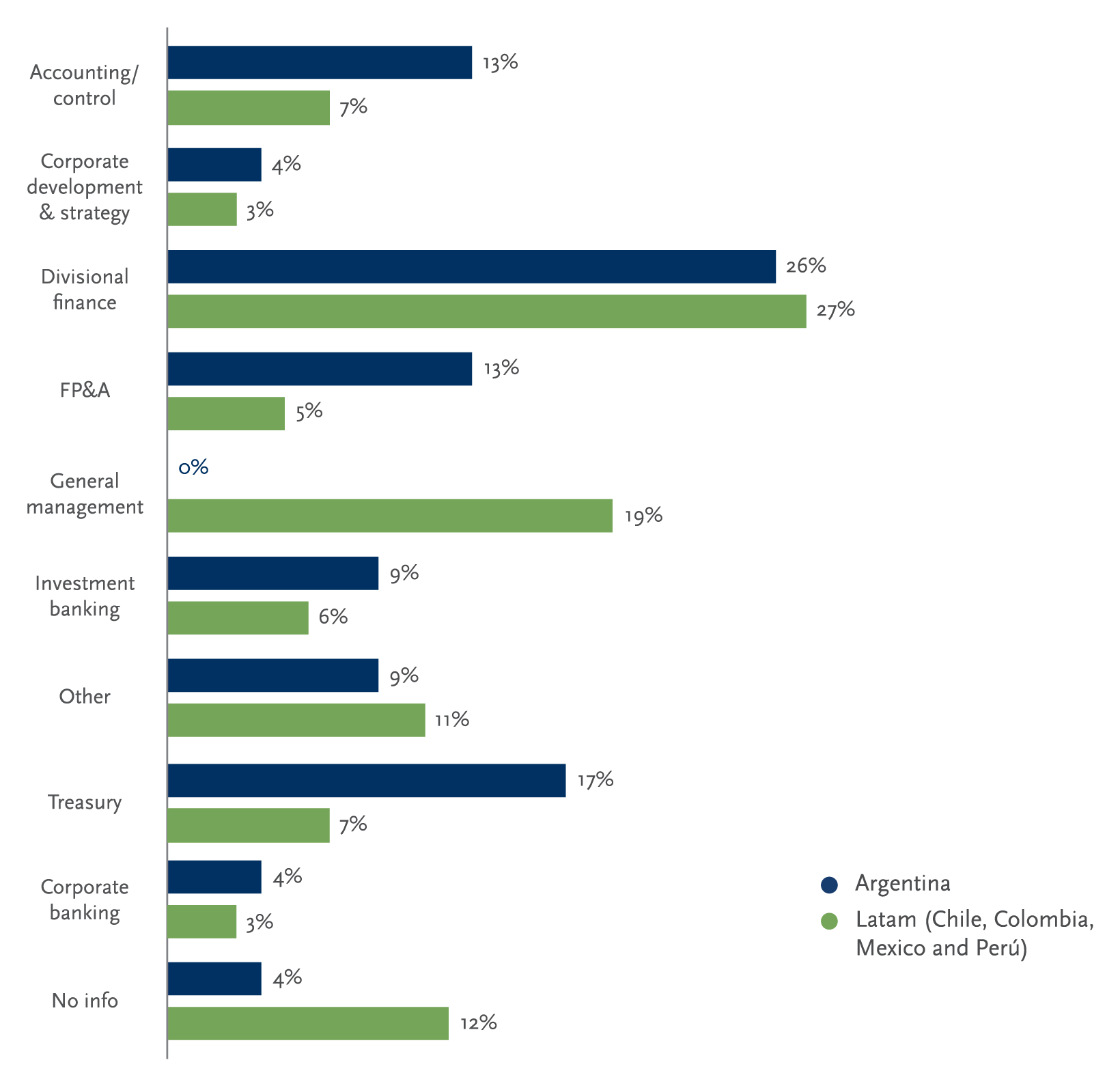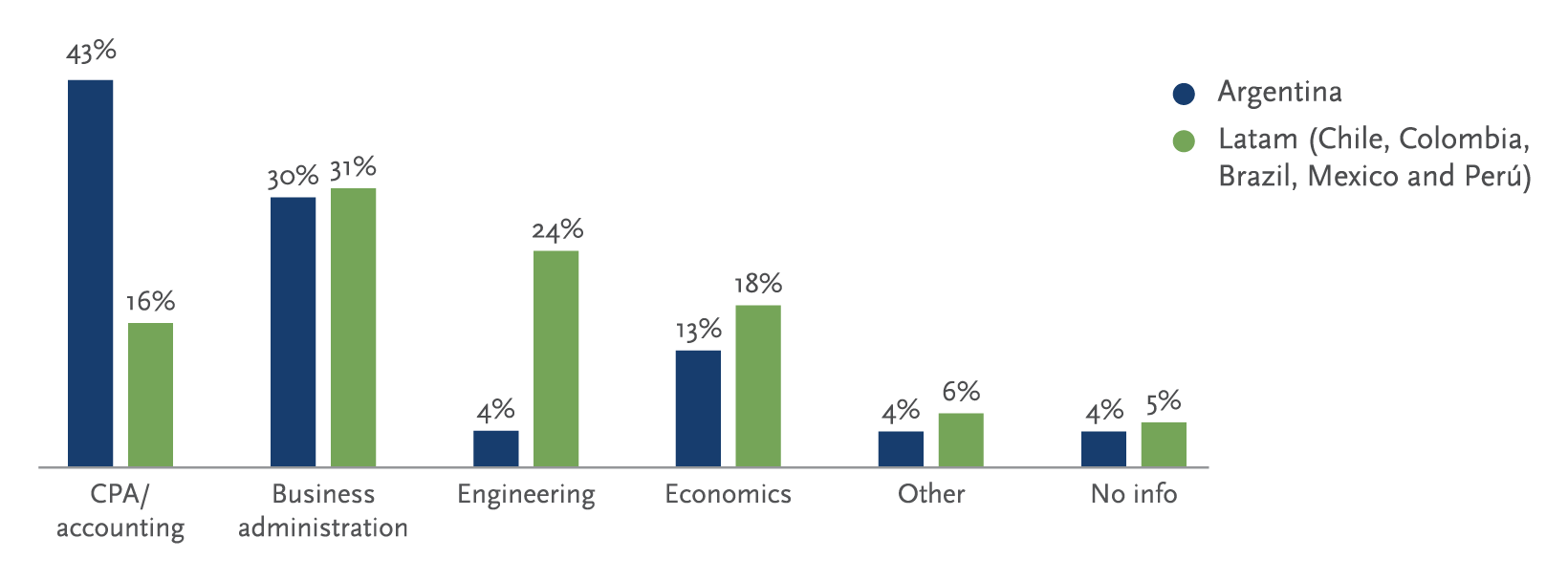When we recruit for the CFO position, clients often ask whether the candidate has previous experience in the position, and which industries we should consider. This study is intended to answer these and several other important questions, as well as offer general guidelines around the CFO’s route to the top in Argentina.
Over the past 10 years, Spencer Stuart has analyzed the background and demographics of CFOs of the largest and most important companies in the United States, Europe and Asia. This is the first time we’ve studied the CFO route to the top for executives in Latin America.
We have performed a rigorous analysis of the careers of CFOs at leading companies in Argentina to better understand what has prepared them for the leadership positions they now occupy. This report pays particular attention to CFOs’ functional experience, their academic background and the difference in profiles between internal and external hires.
Executive summary
- Gender: 95% men/5% women
- Average age: 50 years old
- Country of origin: 95% of CFOs in Argentina are local
- Average tenure: 6.3 years
- Internal vs. external: 62% are internal hires
Gender diversity remains an issue
The percentage of woman among Latin American CFOs is extremely low, and Argentina is no exception — only 5% of Argentine CFOs are female. In other words, there are only two female CFOs in the Merval 25. By comparison, 13% of all Fortune 500 CFOs, 8% of Latin-American CFOs and 6% of European CFOs are women.
While Latin American gender diversity is low, we anticipate this trend will change over the next several years as our clients are increasingly focusing on female talent when hiring.
CFOs in Argentina are older than in Latin America
The average age for CFOs in Argentina is 50, two years older than the typical Latin American CFO age of 48. In Argentina, CFOs were typically about 44 when appointed to their current position, also two years older than the Latin American average. European companies tend to hire CFOs in their mid-40s and Fortune 500 companies hire executives who average 50 years old.
CFOs have held their current position for
more than 6 years
CFOs in Argentina have an average tenure of 6.2 years, and there is a notable difference between the tenure for internally appointed CFOs (5.1 years) and their externally hired counterparts (8.1 years). By comparison, CFOs in the United States have an average tenure of 5.7 years, and UK CFOs average 4.9 years.
Nearly all CFOs in Argentina are from that country
Ninety-six percent of all CFOs are Argentine, which is a higher percentage of homegrown talent than among Latin American (86%) and European CFOs (almost 90%).
Nearly 2/3 of Argentine CFOs are internal promotions
When appointing their current finance leader, 61% of the companies we analyzed promoted internally and did not choose someone with proven experience to be CFO. By comparison, 69% of Fortune 500 CFOs, 68% of Latin American CFO hires and 54% of European CFOs are
internal promotions.
Most external hires have previous CFO experience
When appointing their current finance leader, the majority of the companies promoted internally and did not choose someone with proven CFO experience. But when hiring externally, 63% of the hires had previous experience as CFO. Only 22% of the current CFOs had previous experience in the position in other companies.
Route to the top
The most common primary routes to the CFO role are divisional finance (26%) and treasury (17%). The route up represents the function or discipline in which the CFOs spent the most time in their careers before assuming the top role.

Most Argentine CFOs studied accounting
All Merval CFOs have a bachelor’s degree. Broken down by major, 43% studied public accounting and 30% majored in business administration. Accounting was also the most popular course of study in Mexico, but more CFOs in other Latin American countries tended to major in business administration or engineering.

In Argentina, nearly three-quarters of the CFOs (73%) studied at Universidad de Buenos Aires or Pontificia Universidad Católica de Argentina.
| Academic background |
Argentina |
Brasil |
Chile |
Colombia |
México |
Perú |
Latam |
| Accounting (CPA) |
45%
|
12%
|
8%
|
10%
|
29%
|
12%
|
19%
|
| Business administration |
35%
|
34%
|
44%
|
35%
|
17%
|
47%
|
35%
|
| Engineering (civil, industrial, systems, etc) |
5%
|
23%
|
33%
|
30%
|
27%
|
18%
|
23%
|
| Economics |
10%
|
20%
|
8%
|
15%
|
16%
|
23%
|
15%
|
| Other |
5%
|
7%
|
4%
|
10%
|
4%
|
0%
|
5%
|
| No information |
0%
|
5%
|
3%
|
0%
|
6%
|
0%
|
2%
|
Sixty-three percent of all CFOs have a post-graduate degree. Within that group, 80% studied in Argentine universities (mainly in CEMA and IAE) and 20% studied abroad.
Methodology
For this report, Spencer Stuart conducted research during the first quarter of 2018 into the background and career trajectory of 592 CFOs serving the top companies in six leading indexes:
- Argentina: Merval 25 (25 companies)
- Brazil: Bolsa, Mais, Mais-Nivel 2, Nivel 1, Nivel 2 and Novo Mercado (373 companies)
- Chile: IPSA (40 companies)
- Colombia: Colcap (20 companies)
- México: México IPC (116 companies)
- Perú: Perú Select (17 companies)
This study is the first detailed analysis of the career path of Latin American CFOs, their academic and professional background, internal and external hires, nationality, gender and tenure, among other variables.
Our research goes beyond public information; rather, we have studied each individual's background since the beginning of their careers. This has enabled us to identify patterns and determine what experience is relevant for potential CFOs. This study concentrates on career histories for executives prior to being appointed CFO — specifically for the companies that are part of Merval.
Merval is the main index of the Buenos Aires Stock Market Exchange. The selection criteria for these stocks is based on the volume traded and the number of transactions in the last six months. The rebalancing of the Merval is done quarterly.
B3 - Bovespa Mais, Bovespa Mais Nivel 2, Novo Mercado, Nivel 2 and Nivel 1 were created in order to develop the Brazilian capital market. To make this index, it was necessary to have segments suitable for the different company profiles. All of these segments are valued by differentiated corporate governance rules. These rules correspond to the companies’ obligations under Brazilian corporate law and are intended to improve the evaluation of those that voluntarily join one of these listing segments.
Chile Indice de Precio Selectivo de Acciones (IPSA Index) is the main stock exchange index of Chile. For the first quarter of 2018, this index was composed by the 40 stocks with the highest stock market presence.
This study concentrates on career histories prior to being appointed CFO for the companies that are part of the Colombian COLCAP Index, which includes the 20 most liquid stocks listed in the Bolsa de Valores de Colombia (BVC).
The S&P/BMV Indice de Precios y Cotizaciones (IPC) seeks to measure the performance of the largest and most liquid stocks listed on the Bolsa Mexicana de Valores. The index is designed to provide a broad, representative, yet easily replicable index covering the Mexican equities market.
Perú Select Index is designed to measure the performance of the largest and most liquid stocks listed in the Lima Stock Exchange (Bolsa de Valores de Lima S.A. or BVL).
To view the list of Argentina Merval 25 companies, download the full report.